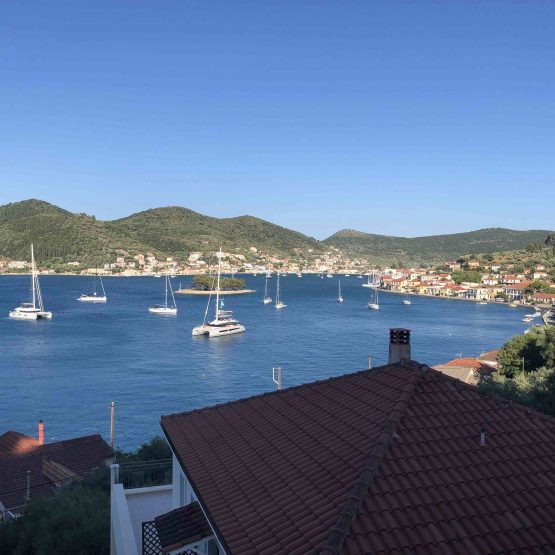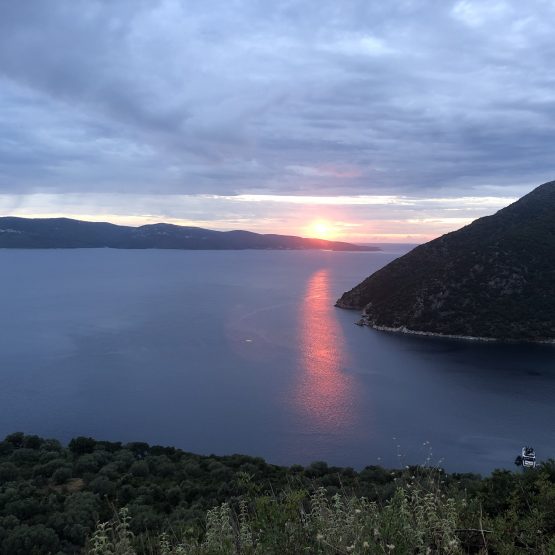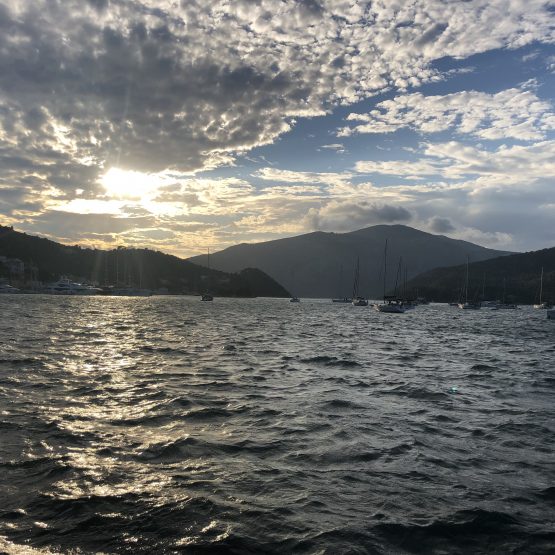Last Call
He knew the flood was coming. No one else in the village did. Ran he ran down the streets of the village yelling at people, informing them of what was to come. The collection of possessions, children and a procession began. More people he informed, running he ran. And on the eastern side of the bay he saw her on a street’s corner. Standing alone she stood, eyes shut, perpendicular. Sleeping she was, while standing. Commotion ensuing and people being informed. He knew this woman. It was the only woman he knew in the village. He’s known her for a long time. He didn’t understand how she was here across the globe nor did he understand how she was nocturnal while standing. The two had an incomplete past and it was easy not to wake her. He had already forgotten her but there she was. More people joined the commotion and the village began its exodus for the mountains—chaotic but timely it was. Time was running out. He knew he had time and she did not. Sleeping she was. Easy it was to leave her behind. Moments left, the decision replete with unrest. A flood ensuing. And bolted he ran up the eastern side of the bay, north, grabbed her shoulders and shook. A man and a woman on a street’s corner, a village emptying, a flood coming. One shake is all it took: A jolt of a shake. Standing she stood. Her eyes opened, consciousness flooded her face, eye lids flickered, pupils dilating when she recognized his, lips curling, released she felt, her arms stretched out and fell she did, onto him, into him, her arms wrapped around him, her entire body limp with trust, hugging him so. The flood was coming.
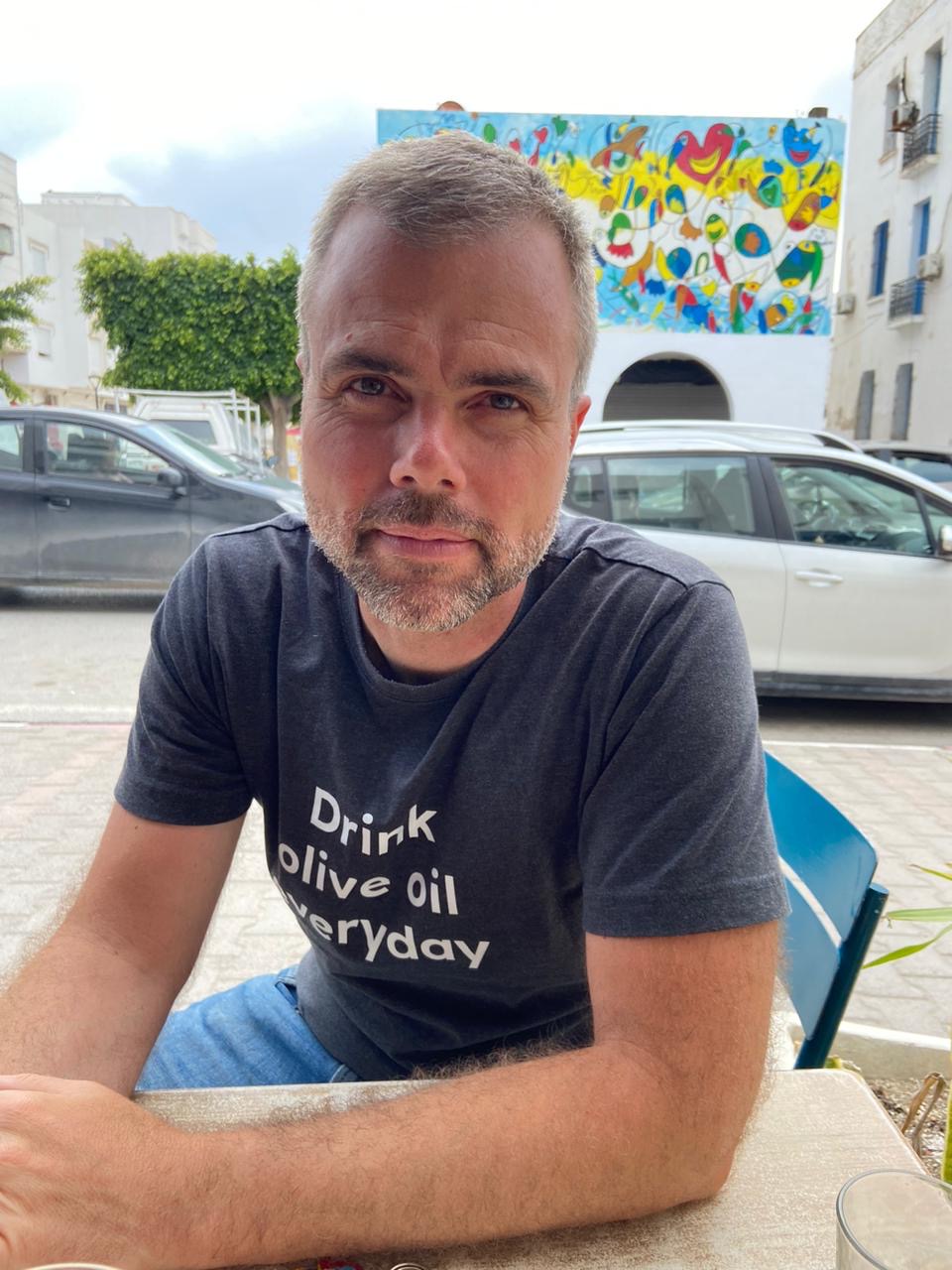
Andrew Schiestel explores and documents the Mediterranean Basin. He was born in Canada.
Elysium
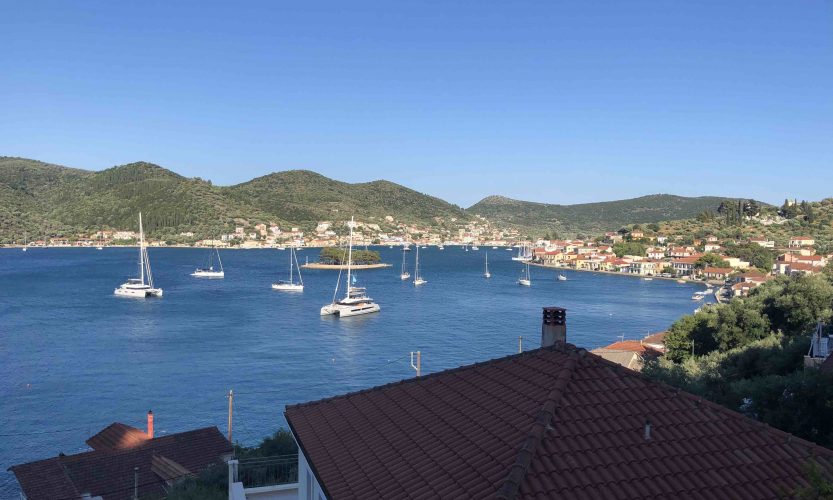
“Want me to take the picture?”
The family of three—husband, wife and daughter—were going to take each other’s photos in pairs; the plan was: first the mother and daughter, and following, the father and daughter.
Tom knew the plan because he heard the trio conversing while passing; the daughter initiated the idea as the party walked eastward along the southern part of Vathy’s bay.
The husband, in his late forties, looked at Tom for an extended moment before responding.
“Yes, thank you.” He smiled graciously.
Tom reached out and the man handed him his phone.
The three were pleasant in demeanour and clearly enjoying the day. The mother was similar in age as her spouse—wearing a light tank-top shirt, worn khaki shorts, black sandals and a modest silver-toned watch; the daughter, around 24 years of age, was a younger spitting image of the two and wore a long flowing dress with flowers imprinted and a bracelet on her right wrist; and the man wore a worn grey t-shirt, dark grey shorts, black sandals and nothing around his wrists.
Tom made sure to take several photos, both portrait and landscape in posture. He also started taking the photos early before the three put on their smiley-faces, because sometimes, you get the best photos of people that way.
“Thank you,” the husband said, accepting the phone back.
“Where are you from?” the wife asked.
“Canada.”
“Ahh, Canada.”
“You all?”
“United Kingdom.”
“Ahh, England?”
“Yes.”
“I was in London a year ago, March, Soho” Tom said. “But never left London. Except for Heathrow. How do you like this island?”
The three nodded.
“An incredible island,” The man looked over at his wife. “The two of us visited this island 25 years ago.”
“Oh wow, that’s a long time ago.” Tom chuckled.
“Yes, it was 1994,” The man recited the year on demand like it wasn’t the first time he had done so on the trip.
“Is it much different?”
“Cephalonia is much different. Ithaca not so much.”
“You mean places like Sami have developed a lot more?”
“Exactly,” The fellow said. “Although Ithaca clearly is getting some interesting tourists these days, like that yacht over there.” He turned and pointed to a prodigal yacht, 150-feet in length, parked on the western side of the bay and chuckled, a hint of sarcasm in his tone.
Tom noticed the yacht too last night when he arrived on the island. It was the largest yacht he had ever seen. It was parked south of a fleet of sailboats—a dozen from the U.K. and one from France.
“You should come for dinner sometime!” The man proclaimed with a chuckle.
“You bet,” Tom played along. “Two years ago I visited Ithaca.”
“Really?” The wife and husband both said almost simultaneously.
The daughter stood still listening intently, keeping very quiet.
“See the mountain over there?” Tom pointed north across the centre of the bay up at Mount Nirito in the distance. “When I arrived in Ithaca, I went into the souvlaki shop at the corner,” He motioned his hand along the southern part of the bay to the southwest corner. All three nodded their heads in understanding. “I asked a Greek woman standing in line, ‘Can the mountain be hiked and how long?’ She said, ‘Yes, two and a half hours up.’ So I thought to myself, ‘Two and a half hours up, two and a half hours back, throw a baguette in the knapsack, a bottle of water, maybe an orange, leave at 8, be back by 1!'”
The three laughed, following along.
“I spent five days in Vathy and was going to do the hike on the sixth and final day. It was the coldest winter Greece had seen in 16 years. The day I woke up to do the hike, it was raining outside and gosh was it cold!”
“Oh no!” The husband exclaimed; all three sinking deeper into the story.
“Yes, and when I started to make my way up the mountain there was plenty of snow! My left foot was starting to freeze as I walked. It was getting dangerous.”
The three continued listening, becoming more intent.
“Near the top of the mountain, I entered a café in the Village of Anogi. The owner of the café knew I wasn’t in good shape, grabbed my arm when I entered, pulled and sat me down on a wooden chair in front of a portable coal fireplace to warm up and laid out nuts and crackers to eat. And upon leaving when I tried to offer her money for them, she refused to accept it.”
The three continued to listen, their attention seized.
“As I was getting ready to leave she went behind a counter and lifted up a woman’s winter jacket and said, ‘Put this on,’ I said, ‘No, I’m not taking your jacket.’ She said, ‘Don’t worry, you’re going back to Vathi, right? My brother works in the coffee shop in the square. Give it to him in the morning.”
“What did you do next?” The husband asked emphatically.
“I put the woman’s winter jacket on, of course! And proceeded to walk four and a half hours back down the mountain! It was 10pm by the time I returned that night to Vathy. And when I got back into the village, I went back to that same souvlaki shop and ate a big plate of souvlaki! And when standing up thirty minutes later, I’d never felt so much pain in my thighs before!”
“Oh wow!” The daughter and mother spurted out simultaneously, all three laughing, a mixture of shock and awe.
“The two-and-a-half hour hike one way turned out to be five and a half hours one way, four and a half back. It ended up being 34 kilometres in total!”
“Wow!” The husband spurted next.
“And if I had known it was going to be 34 kilometres, you bet I wouldn’t have done it in the first place. I wasn’t in shape for it!” All three continued laughing at the thought of it all.
“So where do you live in England?” Tom asked.
“A place called Thornbury, a beautiful country. It’s in the southwest, about 40 minutes from Bristol and the ocean.”
“Sounds beautiful.”
“Aye mate, it really is,” The husband said.
“Well, have a wonderful rest of your trip all,” Tom said. “What a pleasure this has been.” Tom placed his right hand, open, in front of his heart.
The family of three smiled warmly and said their goodbyes to Tom.
“See you in another 25 years,” the husband quipped jovially as Tom walked away.
Tom chuckled.
The family walked back to their 150-foot yacht named Elysium.
The hero image is of the Village of Vathy on the Island of Ithaca, Greece, taken from the northwestern shore. Many sailboats anchored; the centre islet is that of Lazereto, which hosted the island’s jail until the 1950s, and today a chapel.
Elysium is available for purchase as artwork at Ithacabound.com.

Andrew Schiestel explores and documents the Mediterranean Basin. He was born in Canada.
The Elephant And The Turtle
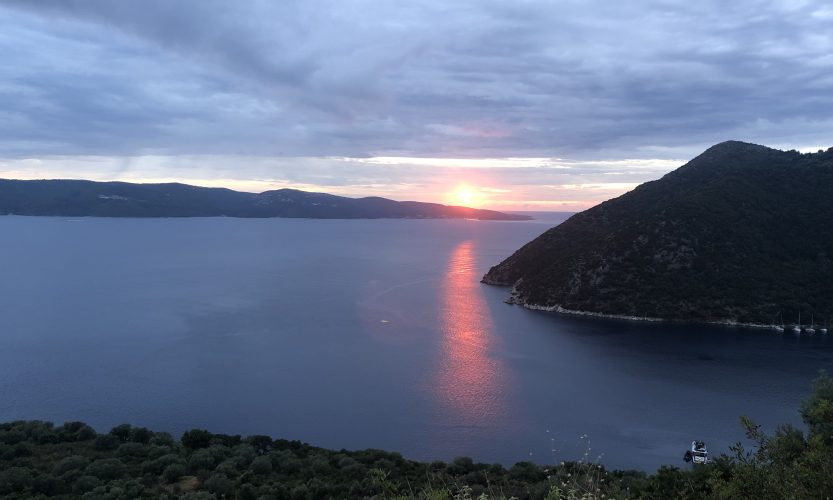
And there was the Port of Aetos.
The ferry docked by way of a cleat hitch around a horn cleat helped by a worker at the port.
Tom disembarked the ferry and set his feet on the Island of Ithaca; he had returned.
Port Aetos was deserted if it weren’t for the travellers, the vehicles waiting for the travellers, the ferry itself, a pop-stand operated by an old woman, and a few construction workers laying cement in a twenty-by-thirty rectangular perimeter that lay on the wharf.
Tom accessed a map software on his phone to check the distance he was to walk. He was staying in Vathy tonight and chose not to risk imposition by asking his host for a ride from the port.
Seven kilometres, the software read.
Tom snapped shut the waist and upper belts of his rucksack, inverted the tinier knapsack around his chest—four straps covering his shoulders in total—and began the trek up the hill towards Vathy, leaving the port.
Halfway up the tall, winding road, he turned back to the port and took a few photos of the ferry departing. The vessel was on its voyage back to Patras to complete another summer’s day of work when a red Datsun sedan pulled up with its windows down. It was being driven by a middle-aged woman—tanned with brown, slightly curly long hair—leaning partly out the driver’s side window.
“Want a ride?”
“I’m going to Vathy,” Tom said. “That alright?”
“I’m going to the north. Can drop you off halfway.” Her English was clear.
Tom unbuckled the straps of his sacks, opened one of the Datsun’s back doors, tossed the sacks onto the backseat and hopped in the vehicle.
“Where you from?” Tom asked.
“Australia.”
“Why are you here?”
“My family is from the northern island.”
“There’s another island in the north?”
“No, same island. But the northern part.”
“Ahh. Greek background?”
“Aye. In the fifties there was an earthquake on the island; a devastating one. Many people lost their homes. The countries of South Africa and Australia were welcoming to those effected. Thousands migrated and many of the families return here in the summer months. Ithaca will always be home.”
The car was up over the hill, winding, bend along bend.
The two made small talk and it wasn’t long until the vehicle entered a cove, a mountain in the distance, and a fork in the road. “Here’s your stop. You go right, I go left.”
“Ahh, thank you for your generosity.” Tom hopped out of the car, opened the backdoor and grabbed his two sacks laying on the seat. As the door slowly began to shut, the Australian-Greek turned to Tom abruptly and hastily stretched her right arm out, palm-up—she was holding two small tawny objects.
“You dropped these,” she said.
“Oh, the elephant and the turtle!” Tom exclaimed with relief. “A man with a kind soul from Senegal came up to me in Athens. His cousin makes them; the material is from the ocean. The Senegalese man said that they bring very good luck to those who hold them.” She gave them back to Tom with indifference, smiled, Tom shut the door, and she drove away.
Good luck was on her way and she didn’t even know it.
The red Datsun drove west and then north around the cove, up the southwestern side of Mount Nirito in a zigzagged pattern through the centre of the isthmus and disappeared into the north.
Tom walked the rest of the way to Vathy.
The hero image is of the sun setting on the Ionian Sea on July 16, 2019. To the left, the Island of Cephalonia; to the right and below, the Island of Ithaca.
The Elephant and The Turtle is available for purchase as artwork at Ithacabound.com.

Andrew Schiestel explores and documents the Mediterranean Basin. He was born in Canada.
Over the Hillside
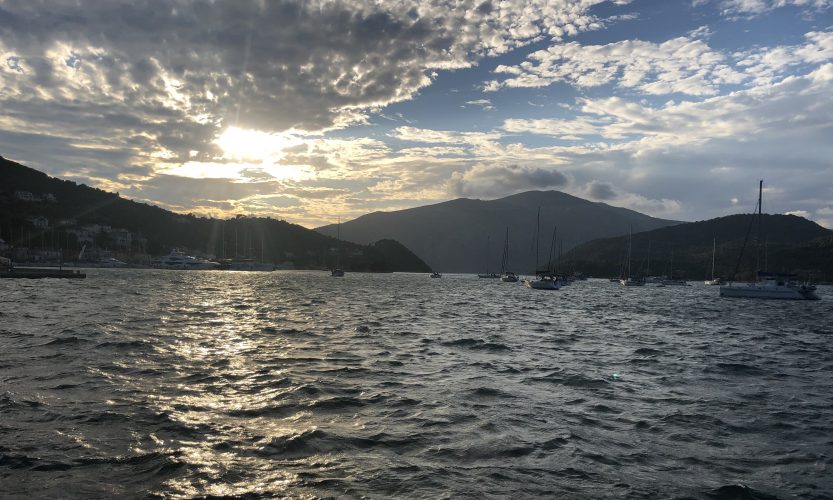
From Holland, I am, She said to the traveller. Why this island? he countered. Because of love. Ahh, yes, it’s a special island, He conversed. Yes, and a man, She said. Ahh, you fell in love. Aye, She responded. You’re from Holland, living in Ithaca, and met a Greek man? Aye, I did. Love and warmth written all across her face. Me and a girlfriend travelled here four years ago. She was snorkelling and I was bored on the beach. The Dutch-woman raised her right hand and pointed over the hillside, east of Vathy. I was trying to read a book, and that’s when he walked up to me. I’ve traveled the world, then ended up falling in love, here. It was sort of funny, and difficult, telling my family I was going to extend my vacation. It happens when you least expect it, She continued, blushing at the recital of it all.
The featured image is of the sun setting on Vathy’s bay on the Island of Ithaca; sailboats anchored for nightfall.

Andrew Schiestel explores and documents the Mediterranean Basin. He was born in Canada.
